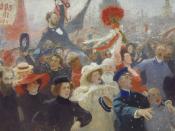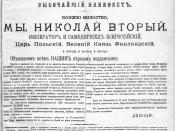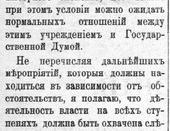Many reforms were undergone to result in Tsar Nicolas abdicating the throne. This happened through a series of major interrelated causes, events, influences, individuals, and groups. The five major and most influential causes to result in the Tsars abdication were; bloody Sunday, 1905 Revolution, Russio-japanese war, October manifesto, and WW1.
For almost all Russia's history, her people were not content, and at the beginning of the 20th century, the average employee worked 11-hour days. Conditions in the factories were very harsh and little or no concerns were shown for these workers. Unions were highly restricted. In 1904 prices of essential goods rose, and in effect the wages of the proletariat fell by 20%. Many Strikes occurred, especially after many people were fired. In order to settle the dispute Gapon (a first union president in Russia) decided to make an appeal to Tsar Nicolas. He drew up a petition, outlining basic rights of the proletariat mainly, for better wages and more suitable hours.
Also among this was a cry for universal suffrage and an end to the russio-Japanese war.
Russia's ethnocentric view over Japan, gave Japan the upper hand in attack. Russia was not expecting Japan to be so organized, and with such a profound military base. Therefore Russia was set up for an embarrassing failure, which left the people with grievances over loved ones, and toward war itself.
Over 150,000 people signed the petition and on the 22nd of January 1905 a similar amount of numbers went to the Winter palace to present the Petition.
Although most of his subjects loved the tsar, they wrote letters to friends in family in case they did not return. They approached the palace singing religious songs, and pictures. This was reacted with the palaces soldiers shooting unmercifully, killing over 100 workers and...


